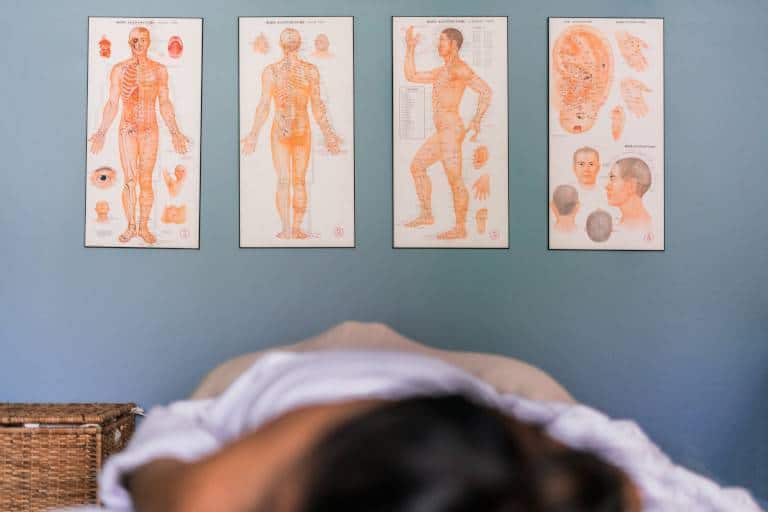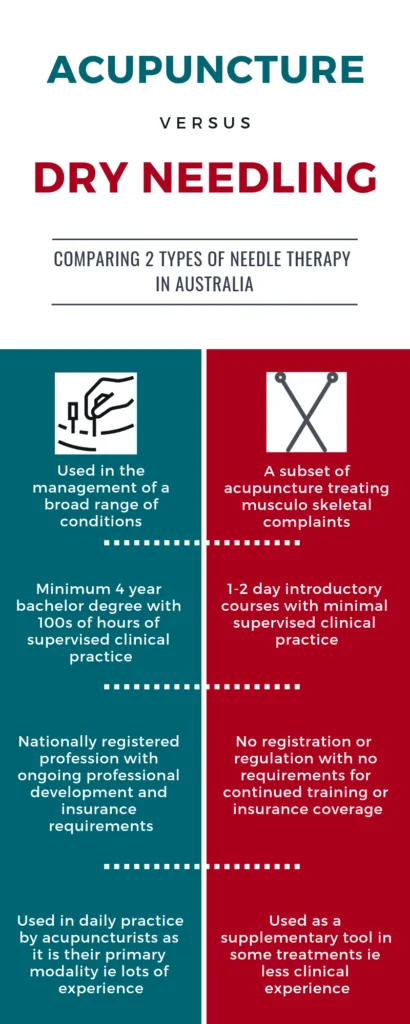So you have decided that acupuncture is for you! Amazing! Now how to find a reputable acupuncturist? What are the essential criteria to consider in choosing from potential acupuncturists? Where do you look to find the best acupuncturist in Melbourne (or where ever you live)?
Here are some considerations on how to choose an acupuncturist that’s best for you?
The essentials
Are they registered?
Australian acupuncturists must be registered with AHPRA (Australian Health Practitioner Registration Agency). An acupuncturists registration status can be checked online here. By seeking a registered acupuncturist, you know they have appropriate qualifications and experience. This means they can provide you with the best treatment for your individual issue.
Are they qualified?
In Australia, it requires a minimum 4-year bachelors degree to qualify as an acupuncturist. This involves training in both biomedicine and Chinese Medicine. Training requirements vary in other countries. An overseas acupuncturists qualifications must have equivalency for registration with AHPRA.
Chiropractors, physiotherapists, podiatrists, osteopaths and doctors can be endorsed by the Chinese Medicine Board to use the title acupuncturist. This requires training and a suitable additional qualification to their primary field of practice. They are not be default trained or qualified to do so.
No other modality can be endorsed as an acupuncturist. This includes naturopaths, massage therapists, myotherapists etc.
Medical practitioners can also be endorsed by the Medical Board of Australia to use the title acupuncturist. The recognised course is delivered by the Australian Medical Acupuncture College over 270 hours. Within this course, only 30 hours are required of mentorship, the only component with supervised needling practice.
Without these endorsements, practitioners may not use the title acupuncturist. This does not, however, prevent them from performing acupuncture in their practice. Very commonly their training and supervised experiences are limited to a 2-day workshop in dry needling.
It is imperative to ask if the provider about to perform acupuncture on you is indeed a certified acupuncturist!
Tweet it Out
These practitioners have extensive knowledge of the human body from the perspective of their field. Their fields are able to treat a wide range of conditions and indeed work very well alongside acupuncture.
This also means that they have limited practical experience of acupuncture needling on patients. They have had little opportunity for supervision by an experienced acupuncturist to refine their skills. Acupuncture is also often used as an adjunct to their primary therapy. This limits their ability to get the hands-on experience that someone with daily acupuncture practice has.
Who would you prefer to service your family car? A full-time car mechanic? Or someone who fixes up his mates’ cars at the weekend?
Are they insured?
In Australia, holding professional indemnity insurance is a part of registration. Acupuncturists enjoy a relatively low cost of malpractice insurance. This is because the underwriters for insurance companies determine acupuncture to be a low-risk treatment. Insurance is also a prerequisite for registration with private health funds.
Considerations
How much do they charge?
You need to be able to afford the treatment offered. The cost of treatment should not inhibit your ability to eat and pay the bills. For those on tighter budgets, student clinics or community acupuncture clinics offer a low-cost option.
Do they offer Health fund rebates?
Whilst this may not be a decisive factor in finding the best local acupuncturist for you, it can help. Private health insurance coverage for acupuncture exists under extras. It is worth checking your policy to see if this may help offset some of the cost of acupuncture treatment.

Where are they located?
Is the clinic easily accessible for you? Sometimes you might find what looks to be the best fit for you, but they practice at the other end of town. This may not stop you seeing that acupuncturist, but should be a consideration. Especially if transit time and the stress of commuting will affect you negatively.
When do they offer sessions?
It is important that the acupuncturist is available when you are. If you work a regular 9-5 schedule, then you need to find someone who accommodates that. Many acupuncturists offer after work or weekend appointments.
Do they have a special area of interest in practice?
Why are you seeking an acupuncturist? Are you looking for acupuncture in IVF support? Acupuncture for fertility support? Acupuncture for back pain? Acupuncture for anxiety or depression? Acupuncture for migraines? There are many reasons why you may be seeking the help of an acupuncturist.
There are no recognised specialities in Chinese medicine and acupuncture practice in Australia. Individual acupuncturists may have a special interest in an area of health. This may depend on their personal background or clinical focus. This means they have studied this area in more depth, acquiring specific skills. This may provide reassurance to you, especially if you have a complex health history.
How much experience do they have?
Years of clinical experience does not necessarily equate to a quality practitioner. Or indeed an acupuncture practitioner that is right for you. At the same time, an experienced acupuncturist may have a deeper insight into your health and wellness issues.
In particular, they have more time and experience in a special interest area. This may mean that their knowledge and experience can help you achieve your health goals.
It is worth bearing in mind though that many recent graduates bring their own background, skillset and enthusiasm. If registered, they are qualified and knowledgable to help you also. They will also know when referral to a more experienced acupuncturist is the best thing for you. The best acupuncturist for you may very well be fresh to the field.
Dantian Health – Melbourne Acupuncture and Chinese Medicine Clinic
Reclaim your health and restore vitality with responsive, holistic healthcare
Do they practice other modalities
Is traditional acupuncture / Chinese medicine their primary focus in the clinic? Or is it an adjunct to other treatments?
A practitioner’s clinical approach involves many different modalities and approaches. This split focus may mean they may have less mastery of acupuncture alone. That is not to say that they don’t bring something unique to their treatments. Or that their treatments are ineffective.
Their unique integration of modalities may be just what resonates for you. However, their clinical results are attributable to many possible factors. The combination of many modalities may make it hard to see exactly what is working.
Sometimes it is best to not be a jack of all trades and master of none.
What is their style of practice?
There are many different styles of acupuncture. Acupuncture developed in many different regions over time, with many uniques lineages emerging.
TCM is the most common, as it forms the basis of most degree programs taught in Australia. Some of these styles may include:
- Japanese acupuncture – this may include
- Toyohari
- Meridian therapy
- Nagano style acupuncture etc.
- Dr Tan balance acupuncture
- Master Tung acupuncture
- Scalp acupuncture
- Korean hand acupuncture
- Five-element constitutional acupuncture
- Esoteric acupuncture
A specific style may be more suitable for you or your particular health issues. Each different styles also has different treatment flows. In some styles, the acupuncturists may spend the entire session with you alone. In others they may be treating 3 or more people simultaneously, allowing them to rest with needles inserted.
Their practice may offer you private treatment rooms, offering a silent and confidential space. Others acupuncturist work in an open space. This allows less privacy but also the potential for a collective group healing vibe to build.
This is not to say one is better than another, they are simply different. Each will resonate for different people – be that practitioner or patient.
Where to look
Search online
A search on google (e.g. “acupuncture near me”) may help you find a local acupuncturist. Other directories such as Yelp or more specific health directories can be of use. AACMA offers an online search facility to find a registered acupuncturist near you.
You may observe on some directories, reviews for acupuncturists. Reviews and testimonials are restricted in Australia. Therefore the quantity of reviews is not an accurate quality guideline. This is a further discussion of acupuncture reviews.
Ask someone you know and trust for a referral

The best source to find a good acupuncturist is your trusted friends and family. It is likely that you know someone who has been to see an acupuncturist. They may be happy to give you their personal feedback on them and discuss their experience of receiving acupuncture.
Their recommendation may not be the right acupuncturist for you. But they may know someone close to you that will be able to help you best.
Your appointment
Have a session
Once you think you have found the best acupuncturist to help you, the next step is to have an acupuncture session. Your decision-making process is still not over as you must now determine if they actually are the best acupuncturist for you.
What is their clinic setup like?
Do they work out of a room in their house, a high-end spa, a dedicated acupuncture clinic, a multi-modality clinic? Where do you feel comfortable is the most important factor when considering this.
It is also important to assess their set up once you arrive. Is the space warm? Does it make you feel welcome? A dirty and unkempt treatment space may reflect lower than expected hygiene standards.
Do they ask questions before outlaying your treatment plan?
It is difficult for a practitioner to know how long you will need treatment for. A consultation is necessary to understand your particular condition and circumstances. This may occur over the phone. Without this only a loose plan can be developed.
Do they identify your health goals? Do they understand how that affects your life?
It is important that an acupuncturist understand why you have sought treatment. Not only in the context of a symptom, but also in how this affects your life.
For example, back pain may be what brings you in the door. But your motivation to seek treatment is that it prevents you from gardening.
This allows for a more holistic assessment of your health and the establishment of goals. From here a more complete treatment plan can be developed for you.
Do they answer your questions?
Also just as important as asking you questions is that they answer your questions too. It’s a good idea to ensure you feel comfortable in your knowledge of what they will do and why.
Do they provide a treatment plan?
Once the acupuncturist has assessed your circumstances, you should be provided with a treatment plan. They should be able to provide you with an outlay of how often you need to attend and for how long. They should help you define your goals. You should agree on what measures you will determine the progress of treatment with. They should also outlay at which stages you intend to review progress.
Do they provide lifestyle advice to empower you in your own health care?
A holistic treatment should:
- help your body to restore balance
- alleviate your presenting symptoms
- empower you to prevent their return
This may include stretches, exercises, diet or lifestyle modifications. These tools you can apply to reclaim your own sense of control over your health issues.
In some circumstances, this may involve referral to a practitioner of other modalities. This allows you to work together to create a rounded health care plan for you.
Your experience during treatment?
Did you feel heard? Did you feel your issues were attended to? Do you feel a connection to the practitioner?
Treatment is a personal thing. You should feel able to connect with your acupuncturist, that there is a level of rapport present. This connection allows you to relax and open up to receive treatment. It also allows them to see you more openly, to best learn your treatment needs.
Are they helping you with your health concerns?
Remember that healing can take a few sessions. Don’t base your assessment of if acupuncture can help you from one session alone.
Of course, you are not going there just to have needles stuck in you. You are seeking a sense of resolution with your health concerns.
It is important to review your progress periodically. This is a time to raise any concerns you have with your acupuncture practitioner regarding your treatment outcomes.
If you have been seeing the same acupuncturist for an extended period of time without change, it may be worthwhile getting a second opinion.
In conclusion
To find a good acupuncturist for you requires a bit of research and consideration of your own needs. This is an investment in your own health and you should do your own research first.
Ultimately their skills and experience play a part in the equation. Equally important is their rapport with you and the ability to guide you towards better choices for your own health.
What else would you like to know?
Thanks for reading this far. Have I missed your question? Was something unclear? Let me know in the comments below, I read and respond to everyone!





